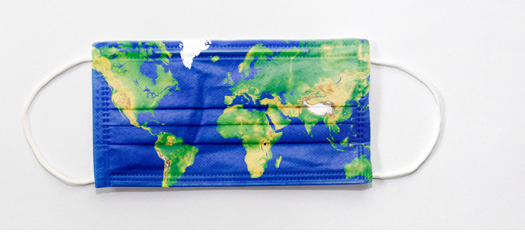The year 2020 marked the beginning of a new decade dubbed the “Decade of Action” as countries accelerated actions towards the achievement of the 2030 Agenda for Sustainable Development. However, the COVID-19 Pandemic has been a major setback to the strides made towards the attainment of Sustainable Development Goals (SDGs). The Global economic recession as a result of the COVID-19 pandemic has exacerbated poverty and further increased inequalities among countries, denting the prospects of achieving SDGs by 2030.
Despite the negative impacts on human life and global economies, the COVID-19 pandemic has brought about some relief to the fight against global climate change. This is because air emissions have been reduced during the current lockdowns. Climate activists have been continuously lobbying for action to address the climate crisis. They have been calling upon national governments to take urgent action towards reducing Greenhouse Gas (GHG) emissions in order to achieve the goals of the Paris Agreement The long term temperature goal of the Paris Agreement is to hold the increase in the global average temperatures to well below 2°C above pre-industrial levels and pursue efforts to limit the temperature increase to 1.5°C above pre-industrial levels.
The 10th Edition of the United Nations Environment Emissions Gap Report for 2019 shows that the emissions gap is now greater than before. UN Environment defines the emissions gap as the difference between where global GHG emissions are heading under the current Nationally Determined Contributions (NDCs) and where science indicates emissions should be in 2030 to be on the least cost pathway to achieve the goals of the Paris Agreement. According to UN Environment, national commitments will only contribute a third to the reduction of emissions required to meet climate targets. Under such a trajectory, it will be impossible to achieve the long term temperature goals of the Paris Agreement.
The year 2020 has been a historic year in terms of GHG emission reductions as annual global emissions are declining at unprecedented rates as a result of the COVID-19 pandemic. The International Energy Agency (IEA) Global Energy review 2020 report shows that there was a 3.8% decline in the global energy demand for energy in the first quarter of 2020 which resulted in the decline of global Carbon dioxide emissions in 2020. Global Carbon dioxide emissions are expected to continue declining and the decline is set to be almost twice as large as all previous declines since the end of World War 2 combined ” according to this report.
Before the pandemic, the “Business As Usual” approach was causing environmental destruction, social injustice and economic inequality as a result of unsustainable investment and behaviour which promoted environmental degradation. Despite the major setback to the attainment of SDGs, Covid-19 has resulted in the decline of GHG emissions below unprecedented rates and has therefore presented the world with an opportunity to rebuild sustainably and in a climate sensitive manner. One way to achieve sustainable development post-Covid-19 is through a Green Economy which promotes economic development, environmental sustainability and social inclusion.
Every change has implications and a transition to a low carbon or green economy has social and employment impacts. However, it is critical to manage change by minimizing risks whilst also maximizing the opportunities brought about by the change. Climate change action has benefits and the Just Transition has been developed to optimize the benefits of the action. Just Transition is a framework used to achieve climate action and social inclusion. It addresses climate action taking into account human rights, labour standards and inclusive growth. The focus now is towards the creation of Green Jobs so as to simultaneously address SDGs 1, 8, 13 and 15. Green Jobs promote economic growth whilst reducing negative impacts on the environment.
Zimbabwe became a signatory to the United Nations Framework Convention on Climate Change (UNFCCC) in June 1992 and ratified the convention in November 1992. In October 2015, Zimbabwe submitted its Intended Nationally Determined Contribution (INDC) to the UNFCCC to cut per-capita energy emissions by 33% by 2030 under a ‘business-as-usual scenario” and currently in the process of revising its NDCs. As a result of the social and employment implications of climate action, an assessment of these implications should guide the development and implementation of the NDCs so as to ensure a Just Transition by incorporating measures to address their impacts.
In 2020, Zimbabwe started to assess the potential for Green Jobs and Just Transition with an aim of creating a model of the Green Jobs economic assessment to see the outcome of adopting the Just Transition model in Zimbabwe. An Inception workshop to assess social and employment impacts of NDC policy to guide Just Transition and NDC enhancement was done in June 2020. The modelling is currently progress in progress and results are expected end of October.
